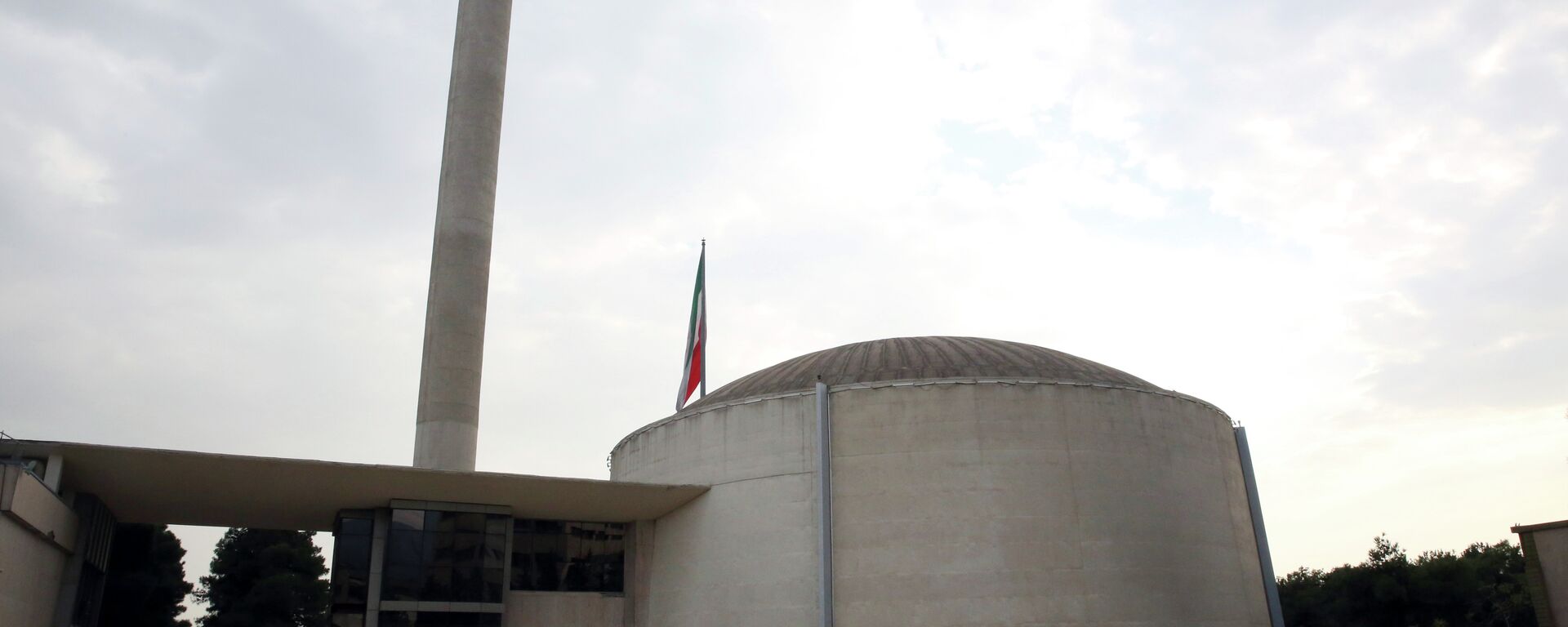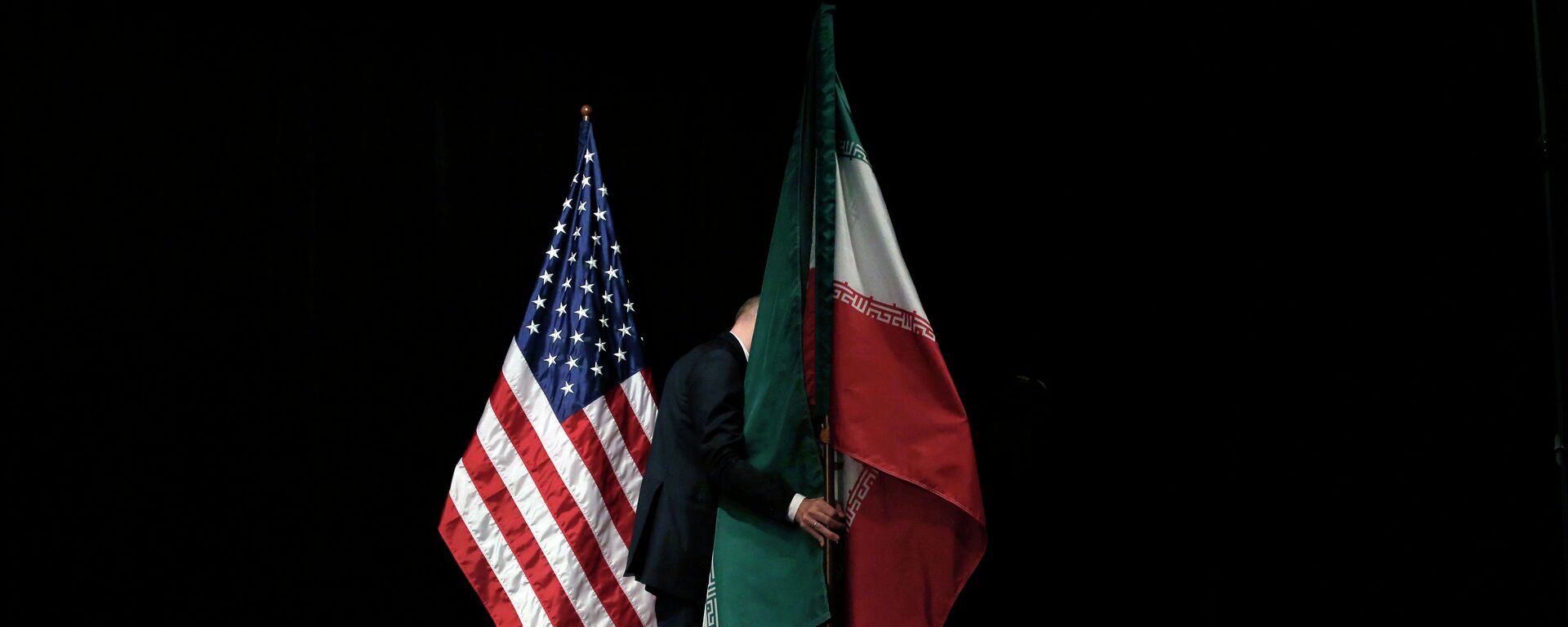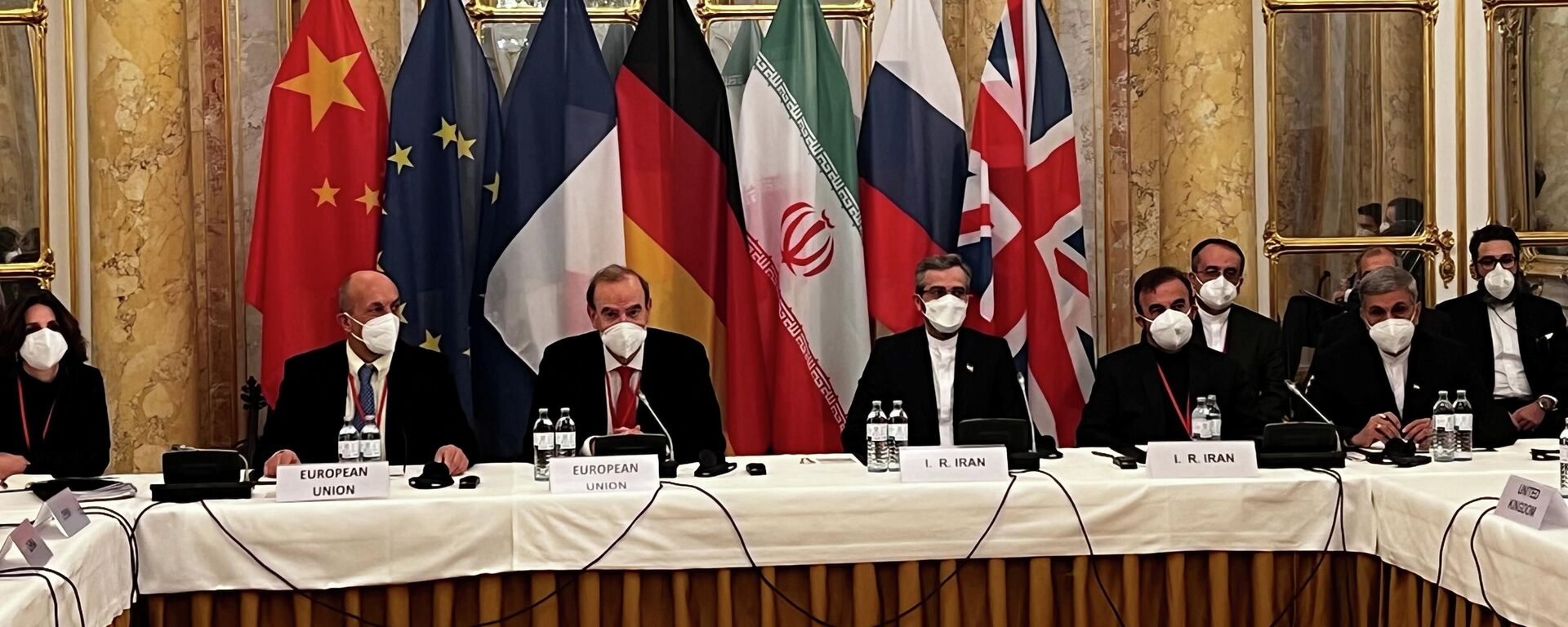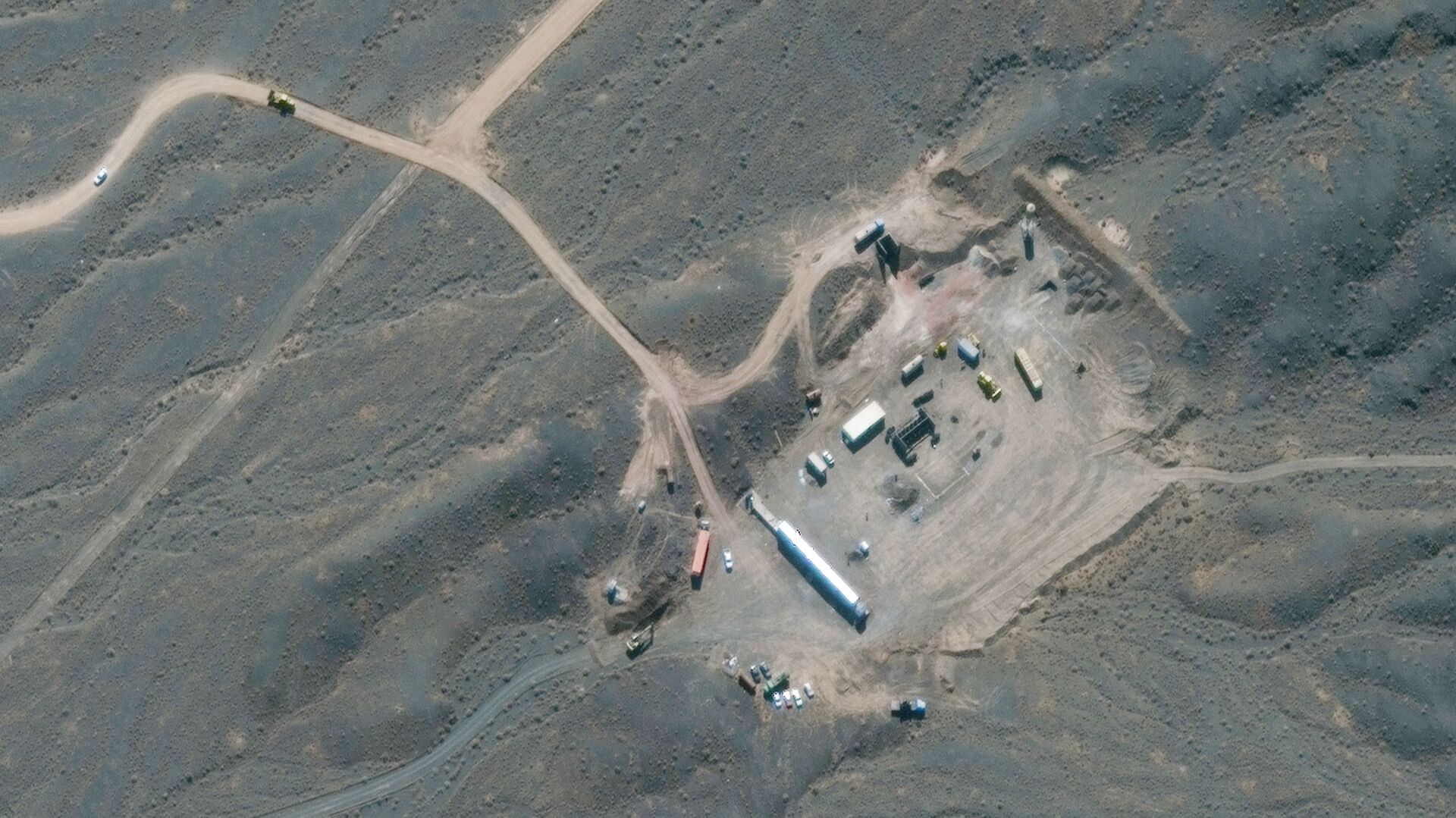https://sputnikglobe.com/20211211/israel-consulted-us-prior-to-covert-strikes-on-iranian-nuclear-site-missile-factory---report--1091449769.html
Israel Consulted US Prior to Covert Strikes on Iranian Nuclear Site, Missile Factory - Report
Israel Consulted US Prior to Covert Strikes on Iranian Nuclear Site, Missile Factory - Report
Sputnik International
The Israeli government reportedly consulted with US officials prior to carrying out covert airstrikes against an Iranian nuclear facility in Karaj and a missile factory just west of Tehran.
2021-12-11T23:05+0000
2021-12-11T23:05+0000
2022-08-06T13:27+0000
tehran
tel aviv
israel
iran
terrorism
washington dc
sabotage
joint comprehensive plan of action (jcpoa)
airstrikes
us
https://cdn1.img.sputnikglobe.com/img/07e5/04/0d/1082622588_0:161:3067:1886_1920x0_80_0_0_b291cd019f07db585312b99c75fa6480.jpg
The Israeli government consulted with US officials prior to carrying out covert airstrikes against an Iranian nuclear facility in Karaj and a missile factory just west of Tehran, The New York Times reported on Saturday, citing individuals briefed on the actions.The outlet's report was based on discussions with over a dozen US and Israeli officials who spoke on the condition of anonymity. Israel has not accepted responsibility for either strike.The first referenced attack was the June strike on an Iranian nuclear facility in Karaj. The strike - deemed a "terrorist attack" by Tehran - resulted in the destruction of the International Atomic Energy Agency-monitored site.The nuclear facility was responsible for the manufacturing of nuclear centrifuges, noted those briefed on the June attack.The later attack was conducted on a factory that belonged to the Aerospace Industries Organisation's Shahid Hemmat Industrial Group, which handles matters related to Tehran's liquid-fueled ballistic missile programme. Satellite images produced by ImageSat provide a look at the damage sustained in the September 27th strike. Officials revealed that in the days leading up to the indirect US-Iranian nuclear talks, it was made clear that Washington and Tel Aviv had different approaches concerning Tehran's nuclear ambitions.During a "contentious" call last week, Israeli Prime Minister Naftali Bennett told US Secretary of State Antony Blinken that Iran was attempting to blackmail the US into signing a "reckless" agreement that would ultimately allow the country to reach bomb-grade uranium enrichment levels.Additionally, reports emerged late last month detailing that senior Israeli officials were concerned that the US-Iranian nuclear talks in Vienna would result in Washington accepting a "less-for-less" deal that would allow Tehran to receive partial sanctions relief in exchange for a pause or rollback on its nuclear work.Bennett pledged to not make the same "mistake" as the 2015 Joint Comprehensive Plan of Action (JCPOA) agreement, and said that Tel Aviv will maintain freedom of action in the event that Tehran and other world powers draft a new nuclear agreement.US officials told the NYT that such an offer is not currently on the table.The American side also expressed reservations regarding the counter-productive nature of covert Israeli strikes on Iranian nuclear facilities, arguing that such acts allow Tehran to rebuild their facilities with more efficient and modern technology.Israeli officials, however, have been left with doubt and fear that US officials are having secret discussions with Iran in Vienna, Austria.On Saturday, Ali Bagheri Kani, Tehran's top negotiator in the ongoing US-Iranian nuclear talks, emphasised that several issues "which require decision-making at the high-level" remain unresolved. Iran has accused Israel of conducting a number of attacks against its nuclear programme, including the November 2020 assassination of Mohsen Fakhrizadeh, a top Iranian nuclear scientist. While Israel has called on the US to tighten sanctions against Iran and implement restrictions on its missile programmes, Tehran has asserted that all sanctions must be lifted and the agreement must not include unrelated missile clauses.In May 2018, then-US President Donald Trump unilaterally pulled the US out of the JCPOA agreement - also known as the Iran nuclear deal - and reimposed sanctions that crippled the Iranian economy. Tehran soon after abandoned its commitments under the agreement.Following the election of US President Joe Biden, negotiations to revisit the agreement kicked off in April but stalled in June, when Iranian President Ebrahim Raisi took office. Talks more recently saw a pause from the US after American officials concluded that Iran was "not serious" about the ongoing talks in Vienna.
https://sputnikglobe.com/20210930/irans-nuclear-chief-says-june-sabotage-inflicted-severe-damage-on-karaj-facility-1089554371.html
https://sputnikglobe.com/20211126/israel-reportedly-concerned-us-may-strike-partial-nuclear-deal-with-iran-1091027693.html
https://sputnikglobe.com/20211205/iran-blames-us-stubbornness-on-sanctions-for-breakdown-of-vienna-nuke-talks--1091266267.html
tehran
tel aviv
israel
iran
washington dc
Sputnik International
feedback@sputniknews.com
+74956456601
MIA „Rossiya Segodnya“
2021
News
en_EN
Sputnik International
feedback@sputniknews.com
+74956456601
MIA „Rossiya Segodnya“
Sputnik International
feedback@sputniknews.com
+74956456601
MIA „Rossiya Segodnya“
us, israel, nuclear, missile, factory, strikes
us, israel, nuclear, missile, factory, strikes
Israel Consulted US Prior to Covert Strikes on Iranian Nuclear Site, Missile Factory - Report
23:05 GMT 11.12.2021 (Updated: 13:27 GMT 06.08.2022) Earlier this year, Iran's Karaj nuclear facility and a missile base were targeted in alleged "hostile" attempts to cripple the country's defences and impede Tehran's nuclear research. Though Tel Aviv has not taken responsibility for the strikes, Israel has declared that the IAF is "determined" and will "not hesitate to act when it is needed".
The Israeli government consulted with US officials prior to carrying out covert airstrikes against an Iranian nuclear facility in Karaj and a missile factory just west of Tehran,
The New York Times reported on Saturday, citing individuals briefed on the actions.
The outlet's report was based on discussions with over a dozen US and Israeli officials who spoke on the condition of anonymity. Israel has not accepted responsibility for either strike.
The first referenced attack was the June strike on an Iranian nuclear facility in Karaj. The strike - deemed a "terrorist attack" by Tehran - resulted in the destruction of the International Atomic Energy Agency-monitored site.
The nuclear facility was responsible for the manufacturing of nuclear centrifuges, noted those briefed on the June attack.

30 September 2021, 15:27 GMT
The later attack was conducted on a factory that belonged to the Aerospace Industries Organisation's Shahid Hemmat Industrial Group, which handles matters related to Tehran's
liquid-fueled ballistic missile programme.
Satellite images produced by ImageSat provide a look at the damage sustained in the September 27th strike.
Officials revealed that in the days leading up to the indirect US-Iranian nuclear talks, it was made clear that Washington and Tel Aviv had different approaches concerning Tehran's nuclear ambitions.
During a "contentious" call last week, Israeli Prime Minister Naftali Bennett told US Secretary of State Antony Blinken that Iran was attempting to blackmail the US into signing a "reckless" agreement that would ultimately allow the country to reach bomb-grade uranium enrichment levels.
Additionally, reports emerged late last month detailing that senior Israeli officials were concerned that the US-Iranian nuclear talks in Vienna would result in Washington accepting a "less-for-less" deal that would allow Tehran to receive partial sanctions relief in exchange for a pause or rollback on its nuclear work.

26 November 2021, 00:45 GMT
Bennett pledged to not make the same "mistake" as the 2015 Joint Comprehensive Plan of Action (JCPOA) agreement, and said that Tel Aviv will maintain freedom of action in the event that Tehran and other world powers draft a new nuclear agreement.
US officials told the NYT that such an offer is not currently on the table.
The American side also expressed reservations regarding the counter-productive nature of covert Israeli strikes on Iranian nuclear facilities, arguing that such acts allow Tehran to rebuild their facilities with more efficient and modern technology.
Israeli officials, however, have been left with doubt and fear that US officials are having secret discussions with Iran in Vienna, Austria.
On Saturday, Ali Bagheri Kani, Tehran's top negotiator in the ongoing US-Iranian nuclear talks, emphasised that several issues "which require decision-making at the high-level" remain unresolved.
Iran has accused Israel of conducting a number of attacks against its nuclear programme, including the November 2020 assassination of Mohsen Fakhrizadeh, a top Iranian nuclear scientist.

5 December 2021, 21:37 GMT
While Israel has called on the US to tighten sanctions against Iran and implement restrictions on its missile programmes, Tehran has asserted that all sanctions must be lifted and the agreement must not include unrelated missile clauses.
In May 2018, then-US President Donald Trump unilaterally pulled the US out of the JCPOA agreement - also known as the Iran nuclear deal - and reimposed sanctions that crippled the Iranian economy. Tehran soon after abandoned its commitments under the agreement.
Following the election of US President Joe Biden, negotiations to revisit the agreement kicked off in April but stalled in June, when Iranian President Ebrahim Raisi took office. Talks more recently saw a pause from the US after American officials concluded that Iran was "not serious" about the ongoing talks in Vienna.




